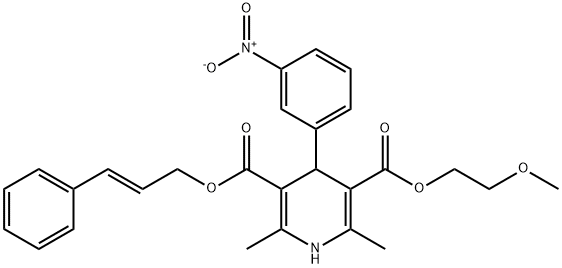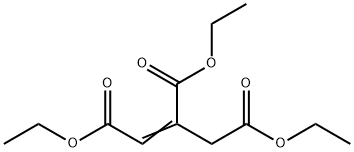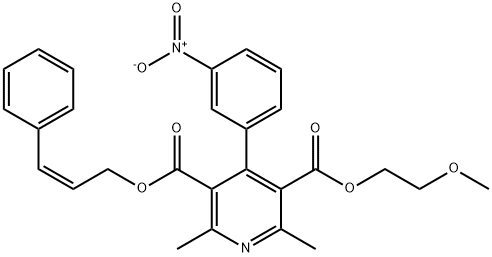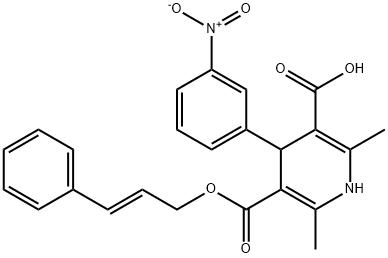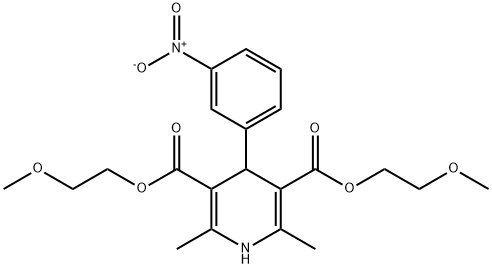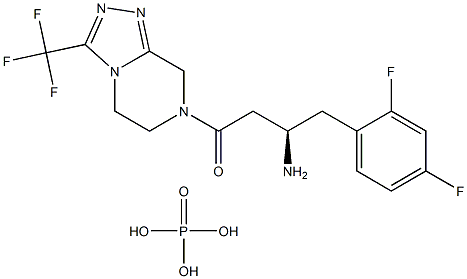Cilnidipine , ≥99% , 132203-70-4
Synonym(s):
1,4-Dihydro-2,6-dimethyl-4-(3-nitrophenyl)-3,5-pyridinedicarboxylic acid 2-methoxyethyl (2E)-3-phenyl-2-propenyl ester;FRC 8653
CAS NO.:132203-70-4
Empirical Formula: C27H28N2O7
Molecular Weight: 492.52
MDL number: MFCD00865853
EINECS: 634-350-6
| Pack Size | Price | Stock | Quantity |
| 1G | RMB104.00 | In Stock |
|
| 5G | RMB352.80 | In Stock |
|
| 25G | RMB1182.40 | In Stock |
|
| 100G | RMB3061.60 | In Stock |
|
| others | Enquire |
PRODUCT Properties
| Melting point: | 97-99°C |
| Boiling point: | 652.6±55.0 °C(Predicted) |
| Density | 1.240±0.06 g/cm3(Predicted) |
| storage temp. | Keep in dark place,Sealed in dry,Room Temperature |
| solubility | H2O: ≤2mg/mL |
| pka | 2.61±0.70(Predicted) |
| form | powder |
| color | light yellow |
| Water Solubility | H2O: ≤2mg/mL DMSO: ≥20mg/mL |
| Merck | 14,2275 |
| InChIKey | KJEBULYHNRNJTE-DHZHZOJOSA-N |
| CAS DataBase Reference | 132203-70-4(CAS DataBase Reference) |
Description and Uses
Cilnidipine is a dihydropyridine calcium antagonist introduced for the treatment of essential and severe hypertension and hypertension associated with renopathy. Cilnidipine has been demonstrated to exert a potent vasodilating effect by blocking calcium influx via dihydropyridine-sensitive, voltage-dependent calcium channels. Compared to nifedipine and nicardipine, cilnidipine is superior, especially for long-term treatment, due to its characteristics of slow onset and long duration with less cardiodepressant activity. Cilnidipine is reportedly well tolerated with low toxicity. It may also be useful in ischemic heart disease.
Cilnidipine has been used:
- in cell viability assay of pheochromocytoma (nPC12) cells
- in photoirradiation and photodegradation studies
- to understand effect on albuminuria in diabetic nephropathy
Safety
| Symbol(GHS) |  GHS05 |
| Signal word | Danger |
| Hazard statements | H318 |
| Precautionary statements | P280-P305+P351+P338 |
| Hazard Codes | Xi |
| Risk Statements | 41 |
| Safety Statements | 26-39 |
| WGK Germany | 3 |
| RTECS | US7975550 |
| HS Code | 29333990 |
| Toxicity | LD50 in male, female mice, rats (mg/kg): 5000, 5000, 5000, 4412 orally; 5000 all species s.c.; 1845, 2353, 441, 426 i.p. (Wada) |

